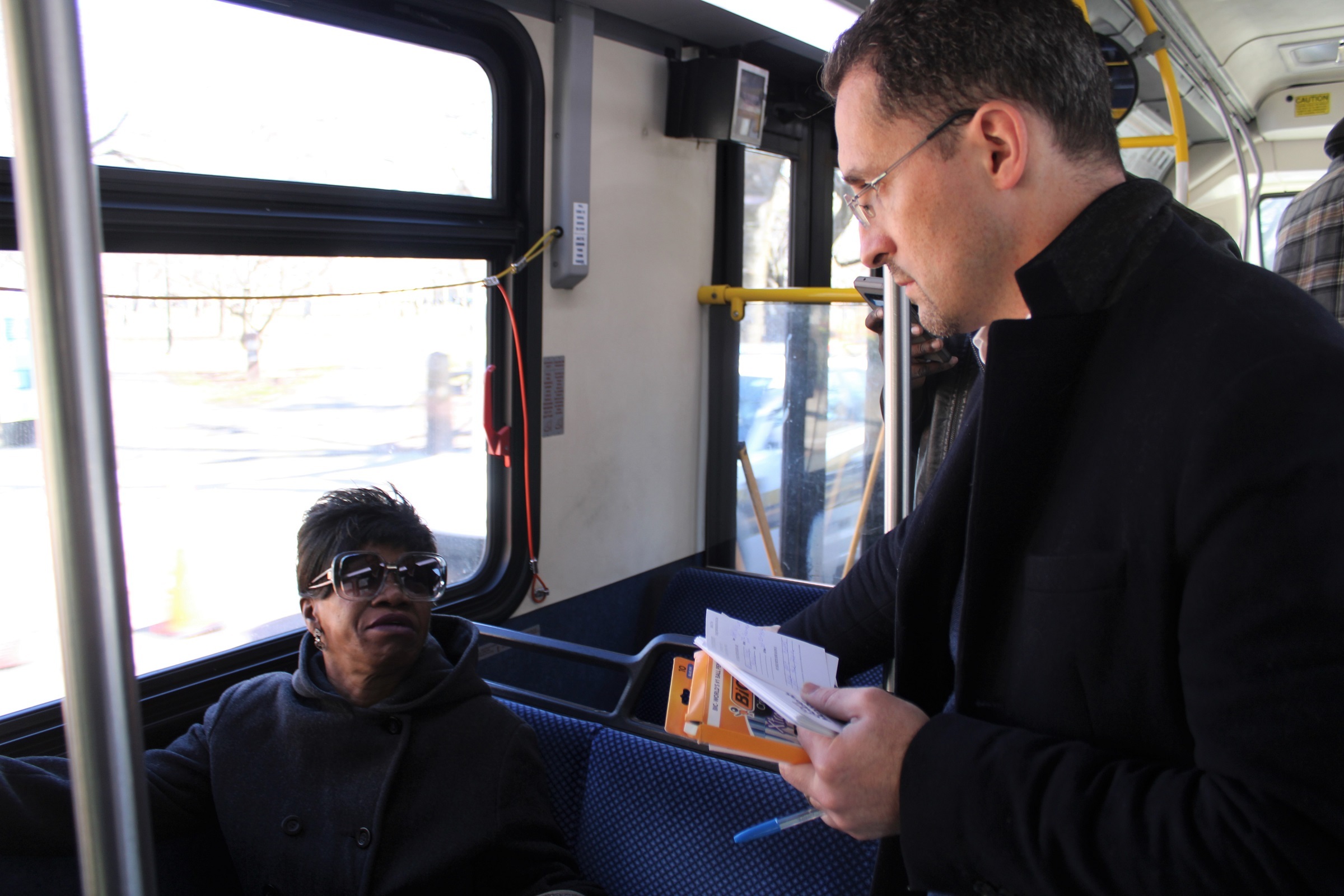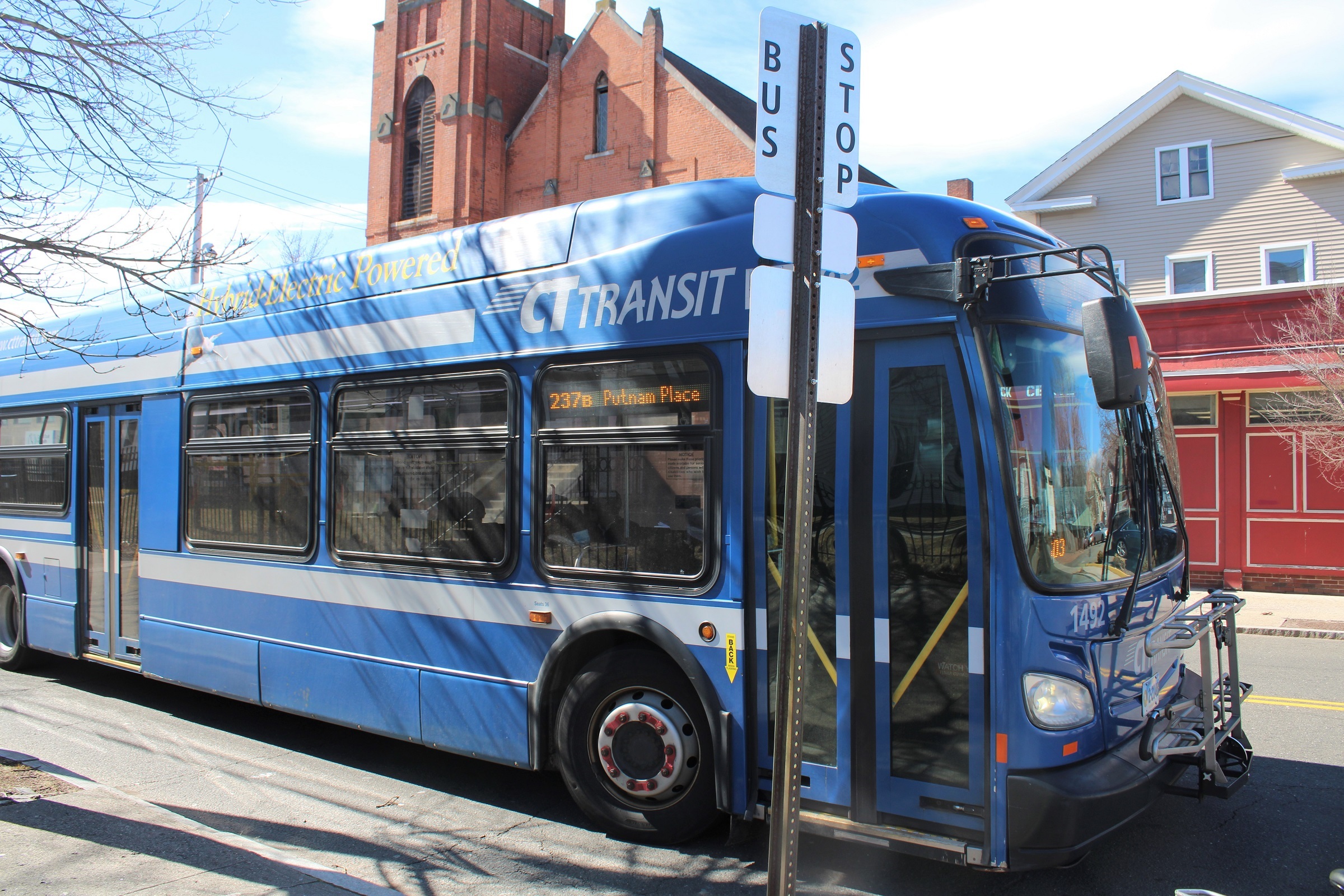
Thomas Breen photo
Wilfred Fuentes, Jayuan Carter, Tom Goldenberg aboard the 206.
Wilfred Fuentes is not looking forward to paying $1.75 again every time he needs to commute from his home in the Annex to his job in Hamden.
Fuentes found a sympathetic ear in a Democratic mayoral challenger who rode the bus and talked to riders roughly two weeks before fares are set to resume for the currently free-to-ride state-run public transit system.
That conversation between Fuentes and Democratic mayoral challenger Tom Goldenberg took place Wednesday morning aboard the 206 bus as it rolled west on Chapel Street through Fair Haven towards the Green.
Goldenberg, who is one of three Democratic challengers and two independents vying to unseat two-term incumbent Mayor Justin Elicker, boarded the 206 at Poplar and Chapel Streets alongside his campaign field director, Poplar Street resident Jayuan Carter.
He did so as part of a weeklong effort to talk directly with riders about how the public transit system is working for them, what could be better, what needs to change.

Waiting for the bus at Poplar and Chapel.

While waiting on the north side of Chapel Street in the brisk sunshine Wednesday just before the bus’s 11:18 pickup time, Goldenberg said he spent three days in a row riding the public bus — from Newhallville to West Haven, from Fair Haven to downtown — talking with riders “to see how the transportation system’s working. Is it serving the needs of the people?”
As a child growing up in West Haven, Goldenberg said he regularly rode the then-“O” bus to take classes at Neighborhood Music School and Educational Center for the Arts. As an adult, he admitted, he has rarely if ever taken the public bus.
He saw this week’s rides as an opportunity to reacquaint himself with what’s working and what’s not, and to talk directly with voters about how the bus is rolling for them.
Goldenberg said he heard the same topics brought up over and over again during his first two days on the bus: Riders are struggling to find good-paying jobs and affordable places to live. Commuters want to see buses run more promptly and on time.
And everyone on the bus, commuters and drivers alike, would like to see the buses remain free to ride.
Since the state first put into place a fare-free holiday in April 2022, Goldenberg said he has heard from riders, the buses have been running with fewer delays — and have presented less of a financial burden to those who rely on them.
He said riders say they worry the return of bus fares on April 1 of this year will only slow down the buses and sap their savings.
“I think fare free was the way to go,” Goldenberg said before he and Carter got on the bus at Chapel and Poplar. If elected mayor, he said, he’ll work with the state to try to find a way to keep buses free going forward. He said he’ll also push for a speedier implementation of some of the many recommendations included in the state-funded decade-in-the-making Move New Haven transit study, including express Bus Rapid Transit (BRT) routes on high-traveled avenues.
“I’m still in listening mode,” Goldenberg said. These rides are more about him hearing from riders, as opposed to him making his pitch to potential voters.
Click here to read a previous Independent article about a resolution that the Board of Alders, led by Downtown Alder Eli Sabin, passed in November that called on the state to keep bus rides fare-free. “Bus fares will be returning on April 1, 2023, and will be the same as before April 1, 2022,” state Department of Transportation spokesperson Shannon King told the Independent for this article. “The fare-free program was a temporary pilot program that required an act of the state legislature to provide additional funding to make up for the loss of farebox revenue. Federal guidelines require conducting a detailed analysis for any changes to services, fares, and routes that extend past the 12-month pilot.”

Goldenberg: "I want to hear how you feel about the bus system."

Thomas Breen Photo
The pending return of public fares was at the front of riders’ minds when Goldenberg boarded the bus at Chapel and Poplar, introduced himself to the dozen seated riders before him, and started handing out pieces of paper urging them to write down their thoughts and leave their contact information.
“I want to hear how you feel about the bus system,” Goldenberg said. “How do you feel about the city? What are the things that you would like to change? This is a chance for people to have a real voice here. This is what this is about.”


Rider-provided thoughts on the bus system.
“Stay free. It will help peoples pockets,” wrote one rider.
“Till now I didn’t have any issues with transit. Perhaps I appreciate that you are providing free transportation. Being an international student it was very useful and helpful,” wrote another.
“No issues with transit,” wrote a third. “But if no taxes for buses it will be good in the days to come.”

Fuentes: "It should stay free."
Wearing a gray hoodie sweatshirt and a black cloth facemask, Fuentes spoke up from his seat halfway down the bus.
“It should stay free,” Fuentes told Goldenberg.
The 38-year-old New Havener said he takes the public bus from his home on Farren Avenue in the Annex to his job in Hamden, where he works at a donated clothing facility.
“How often do you use the buses?” Goldenberg asked.
“Every day to go to work.” Fuentes said.
Why is he worried about fares resuming on April 1? Goldenberg asked.
Paying for the bus $2 ($1.75 if he has exact change) at a time may not seem like much, Fuentes said. But when you have to pay that every time you ride, “it adds up.”
“People are having trouble with rent, with groceries,” Goldenberg commiserated. “We’re heard from a lot of people about fare free. A lot of people want to keep it that way.”

Betty Williams: "New buses" and "more houses for the poor."
As the bus neared Wooster Square, Goldenberg struck up a conversation with Betty Williams, who was sitting closer to the front of the bus.
On the slip of paper she filled out for the mayoral candidate, she called for “new buses” as well as “more houses for the poor.”
She praised Mayor Elicker for “paving my sidewalks, fixing my streets,” and for treating the unhoused people at the Tent City encampment on the West River with respect. That said, she continued, she’d like to see some of the empty warehouses in Fair Haven put to use housing the homeless.
As for how best to fix the bus system, she said, “some of these buses are too loud. They make so much noise” you can hardly hear yourself think. She also worried about a shortage of bus drivers that leads to too few workers and longer delays for riders.

Driver Will A.: "I just learn to cope with the situation."
After the bus arrived at the Green 10 minutes later, nearly all of the Fair Haven riders exited and a few more got on before the 206 turned into 237B to make its way up Dixwell Avenue.
As the Dixwell-bound bus made its way west on Chapel Street towards York, Goldenberg went to the very front of the vehicle to catch up with the man behind the wheel, a Stratford resident and 20-year bus-driving veteran named Will A.
How’s life as a bus driver these days?
“It depends on your attitude,” Will replied with equaninimity.
Bus drivers encounter all different types of people all the time, he said. Seniors, kids, “people down on their luck.” Some are angry. “Others aren’t really going anywhere. There’s so much different personalities. You have to treat each individual special to how they come across.”
If he could say one thing to the mayor — or, in this case, a mayoral challenger — what would it be?
“I’d just like more respect for the drivers,” Will said. When the buses required riders pay a fare to get on board, people would regularly get on the bus and then reach into every pocket as they tried to find their fare card or the right amount of money to ride. That would inevitably delay the bus on its route. Riders further down the line would get mad at him for showing up late.
So requiring fares “slows people down,” Goldenberg said.
That’s right, Will said. This fare-free holiday “has really sped up the bus speed.”
How does he feel about a return to required bus fares on April 1?
“I just learn to cope with the situation,” Will said. “What it is, it is.”
One of the last riders Goldenberg spoke with before this reporter got off the bus near Dixwell and Charles Street identified herself as Felicia. She also pointed to the coming end to the year-long fare-free holiday.
The fares are going away, Felicia said with dismay. “I wish it wasn’t.”

Thomas Breen file photo
Riding up Dixwell Ave.
In a Wednesday afternoon phone interview, Mayor Justin Elicker praised his challenger for speaking up for public transit.
“It’s great that Tom’s advocating for bus ridership and free bus fares. I think that is absolutely something we can all come together on,” he said. “As someone that regularly rides the bus, I’ve noticed people choosing to ride more because of the ease of experience” of not having to pay to board and ride.
Elicker said he’s spoken multiple times with the state transportation commissioner about advocating for buses to remain fare-free. “From what I’m told, it’s more complicated” than just extending the fare-free holiday for a longer period of time, he said. The state would be “required to do an impact study” if the fare-free holiday were extended for a certain length of time. “In the grand scheme of things,” he added, “it’s great” to have fare-free buses and he urged the state to keep the policy in place.
As for the Move New Haven transit study recommendations, Elicker said that the city recently worked with the state to submit a $150 million application for a federal RAISE grant that, if awarded, would fund the creation of the Bus Rapid Transit (BRT) express routes on the city’s major corridors. “It’s a major project,” he said, and one the city is actively working on and eager to advance.